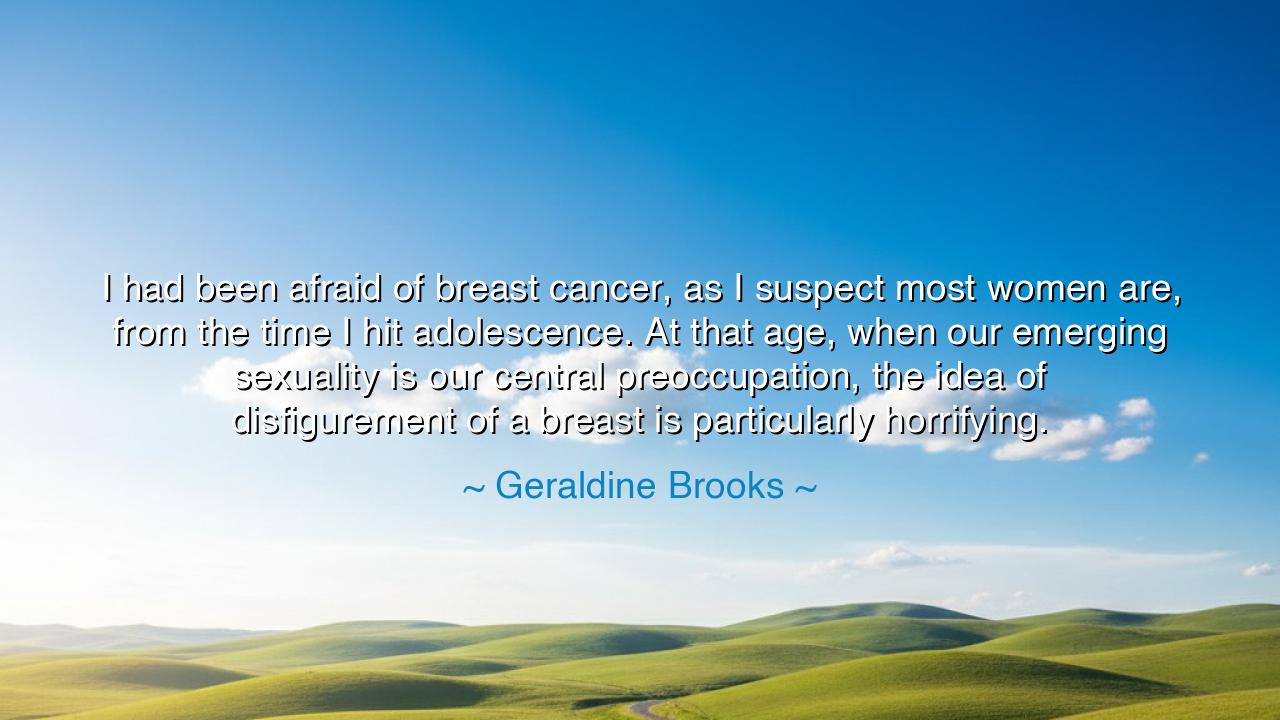
I had been afraid of breast cancer, as I suspect most women are
I had been afraid of breast cancer, as I suspect most women are, from the time I hit adolescence. At that age, when our emerging sexuality is our central preoccupation, the idea of disfigurement of a breast is particularly horrifying.






In the long and ancient history of humankind, the body has always been a source of both pride and vulnerability, its form a symbol of strength and beauty, yet also subject to the harsh forces of fate. Geraldine Brooks, in her poignant reflection, brings forth a deeply personal truth that resonates across generations: "I had been afraid of breast cancer, as I suspect most women are, from the time I hit adolescence. At that age, when our emerging sexuality is our central preoccupation, the idea of disfigurement of a breast is particularly horrifying." These words speak not just to the fear of illness, but to the very essence of what it means to be human—the intersection of body, identity, and vulnerability.
What does it mean, then, that the fear of breast cancer began for Brooks in adolescence, when a woman’s sexuality is coming into its own? Adolescence, the great awakening of the body, is a time when identity begins to shift from childhood to adulthood, and the physical form takes on new significance. For women, this period is marked by the blossoming of the body, the emergence of breasts as a symbol of femininity, fertility, and sexuality. The breast is not just a part of the body—it is a marker of womanhood, an expression of beauty, and often, a reflection of societal ideals. To imagine the disfigurement of such an emblem of womanhood is to face a profound loss, not just of the body, but of one’s very sense of self.
In the ancient world, the body was revered as both a sacred vessel and a source of strength. Consider the Greek goddess Artemis, protector of women and their health. She was often depicted as a strong and self-sufficient figure, deeply connected to the natural world. In ancient societies, the health and vitality of the female body were tied to the life-giving powers of nature and the ability to bear children. Yet, even in these reverent depictions, there existed the quiet fear of the body’s vulnerability. The ancient Greeks understood that the human body, with all its beauty, was also subject to decay and disease, forces beyond one’s control. Even Artemis, in her idealized form, was not immune to the fragility of the human body.
The fear that Brooks expresses is not unique to her alone. It is a universal fear that has been shared by women throughout history. Take, for example, the story of Henrietta Lacks, whose cells, taken without her knowledge in the 1950s, became immortalized in the study of cancer and medical research. Henrietta was a poor African American woman who unknowingly became part of medical history when doctors took her tumor cells for research purposes. Though her cells were used to advance science, Henrietta’s suffering, her fear, and her ultimate death from breast cancer were overlooked. Her story illuminates the deep connection between fear of disease and identity—how the body, particularly a woman’s body, is both sacred and vulnerable. Her story reminds us that illness is not just a physical affliction, but an emotional and psychological burden that affects the very sense of self.
Brooks' reflection also speaks to the unspoken nature of the fear women face. It is a fear that is often not spoken aloud, but one that lives quietly, nestled in the back of the mind, whispering to them from the first signs of puberty onward. In a world that often defines a woman’s worth by her beauty, her body becomes a territory that must be both protected and maintained. The disfigurement of a breast, then, is not merely the loss of a physical part; it is the potential loss of a woman’s identity, her sexuality, and her place in a society that so often prizes these things above all.
The lesson in Brooks' words is not simply about the fear of disease, but about the deep need to reclaim our understanding of the body. It is a call for self-empowerment—to understand that our bodies, though vulnerable, are not defined by the illnesses or imperfections that may afflict them. Just as the ancient heroes faced great trials, so too must we face the trials of our bodies with courage and resilience. We are not the sum of our fears; we are the sum of our strengths, our hearts, and our ability to overcome.
Therefore, let us take this lesson to heart: let us honor the vulnerability of our bodies, but let us also empower ourselves through knowledge, understanding, and acceptance. Let us face our fears, not by hiding from them, but by confronting them with the courage that lives within us all. Just as Brooks speaks to the terror of disfigurement, we must remember that our worth is not found in perfection, but in our ability to embrace the full spectrum of our experiences—our beauty, our imperfections, and our resilience. And in doing so, we will find the strength to face any challenge, knowing that our true identity lies not in the body, but in the soul that it houses.






AAdministratorAdministrator
Welcome, honored guests. Please leave a comment, we will respond soon